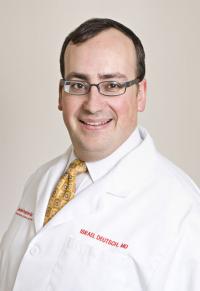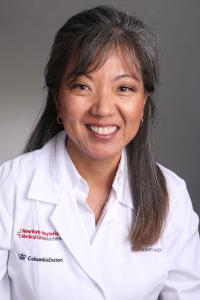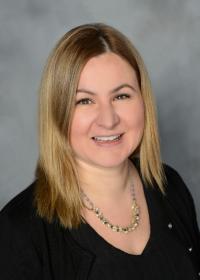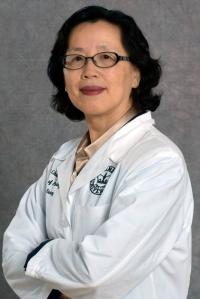Meet Our Team
Columbia Cancer builds a team of medical and support experts around you. We want to bring you multidisciplinary care all in one place. Our experts specialize in genitourinary treatment and support. We coordinate your care to make it as simple as possible and to make sure you have smooth continuity of care during your treatment.
Your Care Team at Columbia Cancer
Your care team may include:
- Gynecologic oncologists, who have advanced training to perform minimally invasive and traditional cancer surgeries and administer chemotherapy for people with gynecologic cancers.
- Radiation oncologists, who use the latest technology to deliver radiation treatments radiation to precisely target and effectively destroy cancer cells, while minimizing toxicity to surrounding normal tissues.
- Imaging radiologists, who look for abnormalities in ultrasounds, CT scans, MRIs, and other visual screening tests.
- Pathologists, who examine tissue and fluid to look for changes in cells in order to classify a tumor’s stage and look for markers that will help your care team determine the best course of treatment for you.
- Medical oncologists, who direct treatments such as chemotherapy, targeted therapy, and immunotherapy.
- Urogynecology surgeons, who have advanced training in female pelvic medicine and reconstructive surgery.
- Nurses and nurse practitioners, who provide hands-on medical and supportive cancer care along your journey. Nurse navigators may also help you through specific processes, such as enrolling in a clinical trial.
- Genetic experts, who help you understand any genetic causes of your cancer and what they mean.
- Fertility experts, who help you make decisions and conduct about fertility sparing procedures if you’re concerned about having children after cancer treatment.
- Mental health experts, including our psychosocial oncology team, who help you and your family cope with the wide range of emotions that come with a cancer diagnosis.
- Social workers, who can help you find resources in the community and provide emotional support.
- Integrative health practitioners, including reiki, massage, acupuncture, yoga therapy, meditation, and more, to help you deal with the physical, mental, and emotional aspects of cancer treatment and survivorship.
- Nutritionists, to help you create and follow a plan that will support the healing your body must do during and after cancer treatment.
- Physical medicine and rehabilitation specialists, who help you regain function you might have lost due to surgery or treatment side effects.
- Spiritual practitioners, multifaith chaplains who can help with your religious, spiritual, and emotional needs and help you make decisions, participate in religious rituals, and more.
- Cancer support groups, run by survivors, that can help you find community and support on your journey.
Showing 11 - 17 of 17 Doctors

Accepting New Patients
Specialties
Hematology/Oncology, Medical Oncology
Academic Appointments
- Assistant Professor of Medicine at CUMC
Location
CUIMC/Herbert Irving Pavilion
161 Fort Washington Avenue
New York, NY 10032

Departments/Divisions
Department of Radiation Oncology
Accepting New Patients
Virtual Visits/Telehealth
Specialties
Radiation Oncology
Academic Appointments
- Assistant Professor of Radiation Oncology at CUMC
Primary Location
CUIMC/Presbyterian Hospital and Vanderbilt Clinic
622 West 168th Street
New York, NY 10032
Schedule an Appointment
New and Existing Patients:
Departments/Divisions
Department of Radiation Oncology
Accepting New Patients
Virtual Visits/Telehealth
Specialties
Radiation Oncology
Academic Appointments
- Assistant Professor of Radiation Oncology at CUMC
Schedule an Appointment
New and Existing Patients:

Departments/Divisions
Department of Radiation Oncology
Accepting New Patients
Virtual Visits/Telehealth
Specialties
Radiation Oncology
Academic Appointments
- Assistant Professor of Radiation Oncology at CUMC
Schedule an Appointment
New and Existing Patients:
Departments/Divisions
Department of Obstetrics & Gynecology, Division of Gynecologic Oncology
Accepting New Patients
Virtual Visits/Telehealth
Specialties
Obstetrics and Gynecology, Nurse Practitioner, Gynecologic Oncology
Academic Appointments
- Nurse Practitioner
Location
CUIMC/Herbert Irving Pavilion
161 Fort Washington Avenue
New York, NY 10032
Schedule an Appointment
New and Existing Patients:

Departments/Divisions
Department of Pathology & Cell Biology, Division of Anatomic Pathology
Accepting New Patients
Specialties
Pathology - Anatomic
Academic Appointments
- Assistant Professor of Pathology & Cell Biology at CUMC
Location
CUIMC/Presbyterian Hospital and Vanderbilt Clinic
622 West 168th Street
New York, NY 10032

Departments/Divisions
Department of Pathology & Cell Biology, Division of Anatomic Pathology, Division of Clinical and Translational Research
Accepting New Patients
Specialties
Cytopathology, Pathology - Anatomic & Clinical, Gynecologic Oncology
Academic Appointments
- Associate Professor of Pathology & Cell Biology at CUMC
Primary Location
CUIMC/Presbyterian Hospital and Vanderbilt Clinic
622 West 168th Street
New York, NY 10032